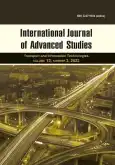Исследование жизненного цикла железнодорожной транспортной услуги с использованием цифровых методов в логистических системах
- Авторы: Никифорова Г.И.1, Полиэктов Д.А.1
-
Учреждения:
- Петербургский государственный университет путей сообщения Императора Александра I
- Выпуск: Том 13, № 3 (2023)
- Страницы: 270-285
- Раздел: Статьи
- Статья опубликована: 30.09.2023
- URL: https://journal-vniispk.ru/2328-1391/article/view/348564
- DOI: https://doi.org/10.12731/2227-930X-2023-13-3-270-285
- EDN: https://elibrary.ru/GVHPLR
- ID: 348564
Цитировать
Полный текст
Аннотация
Статья представляет собой исследование жизненного цикла услуги железнодорожного транспорта при перевозке грузов. Описаны особенности услуги как вида товара. Построена параметрическая модель жизненного цикла предоставления услуги железнодорожным транспортом от момента погрузки грузов в вагоны на станции отправления до момента выгрузки на станции назначения. Проводится сопоставление жизненного цикла предоставления услуги и оборота вагона. Анализируются другие эксплуатационные показатели, особенности их расчета и взаимосвязь. Предлагается минимизация жизненного цикла предоставления услуги за счет цифровизации нормирования эксплуатационных показателей. Представлен алгоритм расчета с использованием цифровых методов, приведены элементы интерфейса программы для расчета и нормирования эксплуатационных показателей. Жизненный цикл предоставления услуги сравним с оборотом вагона, но не учитывает порожний пробег вагона. Минимизация жизненного цикла продукции является важной задачей, т.к. позволит сократить расходы, повысить конкурентоспособность и привлекательность железнодорожного транспорта для грузовладельцев. Цифровизация процесса расчета и нормирования эксплуатационных показателей может решить эту задачу.
Цель – применение периода жизненного цикла продукции к услуге железнодорожного транспорта при перевозке грузов с последующим поиском возможностей повышения качества оказываемых услуг.
Метод или методология проведения работы. В статье использовались анализ предоставления перевозочной услуги с позиции управления качеством, моделирование, а также создание алгоритма и программы для цифровизации ряда операций.
Результаты. Услуга по перевозке груза дифференцирована на этапы периода жизненного цикла, представлена параметрическая модель. Намечены пути минимизации жизненного цикла, что позволит сократить расходы, повысить конкурентоспособность и привлекательность железнодорожного транспорта для грузовладельцев. Цифровизация этапа расчета и нормирования эксплуатационных показателей может решить эту задачу.
Область применения результатов. Полученные результаты целесообразно применять в системе железнодорожных перевозок, в работе операторских и транспортно-логистических компаний, при управлении вагонным парком.
Ключевые слова
Об авторах
Гузель Ислямовна Никифорова
Петербургский государственный университет путей сообщения Императора Александра I
Автор, ответственный за переписку.
Email: guzel.spb@mail.ru
ORCID iD: 0000-0003-4908-3225
доцент кафедры «Управление эксплуатационной работой», кандидат технических наук
Россия, Московский пр., 9, г. Санкт-Петербург, 190031 , Российская Федерация
Дмитрий Александрович Полиэктов
Петербургский государственный университет путей сообщения Императора Александра I
Email: dipol_polipiter@mail.ru
студент
Россия, Московский пр., 9, г. Санкт-Петербург, 190031 , Российская Федерация
Список литературы
- Никифоров В.В., Никифорова Г.И. Цифровизация железнодорожного транспорта с участием операторских компаний // Известия Петербургского университета путей сообщения. 2022. Т. 19. № 4. С. 736-742.
- Солоп И.А., Чеботарева Е.А., Куренков П.В. Инновационные направления развития транспортно-логистической инфраструктуры при пропуске поездов // Транспорт и логистика: актуальные проблемы стратегического развития и оперативного управления. VI международная научно-практическая конференция. Ростов-на-Дону, 2022. С. 223-226.
- Покровская О.Д. Комплексная оценка транспортно-складских систем // Железнодорожный транспорт. 2019. № 7. С. 26-32.
- Управление качеством в автоматизированном производстве: учебник: в 2-х ч./ А. Г. Лютов, Р. Р. Загидуллин, А. Г. Схиртладзе и др. – Старый Оскол: ТНТ, 2015. – Ч. 2. – 376 с.
- Химач И. Р., Самарин В.А., Сергеева Т.Г. Применение цифровых технологий в логистике // УЭРТ–2022. Сборник трудов Международной научно-практической конференции. под редакцией А. Ю. Панычева, Т. С. Титовой, О. Д. Покровской; отв. за выпуск А. В. Сугоровский, Г. И. Никифорова, Т. Г. Сергеева, М. А. Марченко. Санкт-Петербург, 2022. С. 333-337.
- Покровская О.Д. Логистическое руководство: математические основы терминалистики, маркировка, классификация и идентификация логистических объектов железнодорожного транспорта. – Казань, 2017. – 281 с.
- Pokrovskaya O., Orekhov S., Kapustina N., Kizyan N. Formation of logistics facilities in transport corridors // IOP Conference Series: Materials Science and Engineering. 8. Сер. “VIII International Scientific Conference Transport of Siberia 2020” 2020. С. 012032. https://doi.org/10.1088/1757-899X/918/1/012032
- Filipchenko S.A., Bubnova G.V., Kurenkov P.V. Influence of wagon fleet redundancy on railway transport operation quality // Collection of scientific works. Under edition of Y.I. Sokolov, I.M. Lavrov Biochemistry (Moscow). 2017. С. 75.
- Kurenkov P.V., Astafyev A.V., Kolos L.E., Chebotareva E.A., Solop I.A., Denisenko T.V. Development of logistics models for oil cargo transportation to reduce logistics costs and improve wagon mileage // Lecture Notes in Networks and Systems. 2022. Т. 364 LNNS. С. 219-235.
- Nikiforova G. A study of the interaction between rail and maritime transport // International Scientific Siberian Transport Forum TransSiberia - 2021. Switzerland, 2022. С. 145-152.
- Panychev A., Pokrovskaya O. The third-generation university ecosystem in the context of global digitalization // International Scientific Siberian Transport Forum TransSiberia - 2021. Switzerland, 2022.
- С. 100-108.
- Pokrovskaya O.D. Terminalistica as a new methodology for the study of transport and logistics systems of the regions // Sustainable economic development of regions. ed. by L. Shlossman. Vienna, 2014.
- С. 154-175.
- Pokrovskaya O., Fedorenko R. Assessment of transport and storage systems // Advances in Intelligent Systems and Computing. 2020. Т. 1115. С. 570-577. https://doi.org/10.1007/978-3-030-37916-2_55
- Safronova A., Reshetko N., Majerčák J., Kurenkov P. Choosing a scheme for the delivery of foreign trade cargo // Transportation Research Procedia. Сер. “International Scientific Conference on Horizons of Railway Transport 2020” 2021. С. 314-320.
- Vakulenko S.P., Kurenkov P.V., Kuzina E.L., Astafiev A.V., Nadolinsky P.V., Chebotareva E.A., Solop I.A., Vasilenko M.A., Barashyan V.Y., Gašparík J. Influence of innovative elements of railway infrastructure complex on the technology of the transport process // Transportation Research Procedia. 14th. Сер. “14th International Scientific Conference on Sustainable, Modern and Safe Transport, TRANSCOM 2021” 2021. С. 342-347.
Дополнительные файлы










